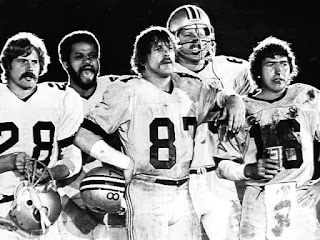Which left Sunny Randall, whom Parker created as a vehicle for the actress Helen Hunt. Parker wrote six novels featuring Sunny, who is perhaps less a female Spenser than a female Jesse Stone, which made it interesting when the two hooked up for a while before deciding they were unsuited for each other (perhaps because each was the other’s alter ego). Her character may be more like Stone’s, indeed both are obsessed with ex-spouses; but Sunny’s set up was closer to Spenser’s, a gay male Chingnachook to her female Hawkeye; she has a dog, Rosie, her version of Spenser’s Pearl, and she also, like Spenser, has close contacts with the Boston mob—in her case because her ex, Richie, is the son of a mob boss.
Parker wrote six novels with Sunny; Blood Feud was the first pastiche taken up by the New York sportswriter and crime novelist Mike Lupica (there are now two more). At this point Sunny is back together with Richie, sort of, but at a loss for work, when someone walks up behind Richie and puts a bullet through his shoulder, saying to him, as he lays on the street “sins of the father”. Of course this puts Sunny on the case, though neither Richie’s father Desmond, nor uncle Felix, nor the Boston cops really want her there.
Nor will the Providence mob nor the Providence cops, when the case takes her south to Rhode Island. Because as Sunny investigates she finds that Richie’s shooting, which leads to more, does indeed have family roots, and they may be roots the family itself does not want dug up.
Lupica has plotted his story very well, and he moves it along, though the finale may seem a little fortunate. His Sunny is best when she is interacting with the established characters, including her ex-cop father Phil, and Frank Belson, who’s one of Spenser’s police foils. Lupica works surprisingly well with the Sunny/Richie business: there is a surprising amount of adolescent angst in their relationship, as opposed to the psychological paradise of Spenser and Susan Silverman (to whom Sunny has been referred for therapy, and with whom she has banter worthy of Spenser’s), or the more sensitive Hemingway of Jesse Stone. Where Sunny does less well is in her moving between Richie’s family, rival Boston crime boss Tony Marcus and Providence godfather Albert Antonioni. There is too much ping-ponging, as the dogged Sunny pursues buried secrets, but also far too many threats; if she was really pissing off people as much as she is pissing off these guys, at some point the threats might turn more real.
Finally, though, there is an unmistakable sense of the outsider in Lupica’s writing, like a New York Yankee fan writing about the Boston Red Sox. There is the feel of the guide book in the places she goes out for meals or drinks, about the directions or descriptions. It’s harder to get the sense of someone who knows the turf the way Sunny is supposed to; indeed, they way she does. Lupica’s prose can be sharp and balanced as Parker’s; he gets that bit of the style. But can he learn to be Boston enough?
Robert B Parker’s Blood Feud by Mike Lupica
No Exit, £9.99 ISBN 9780857303820
note this review will also appear in Crime Time (www.crimetime.co.uk)



